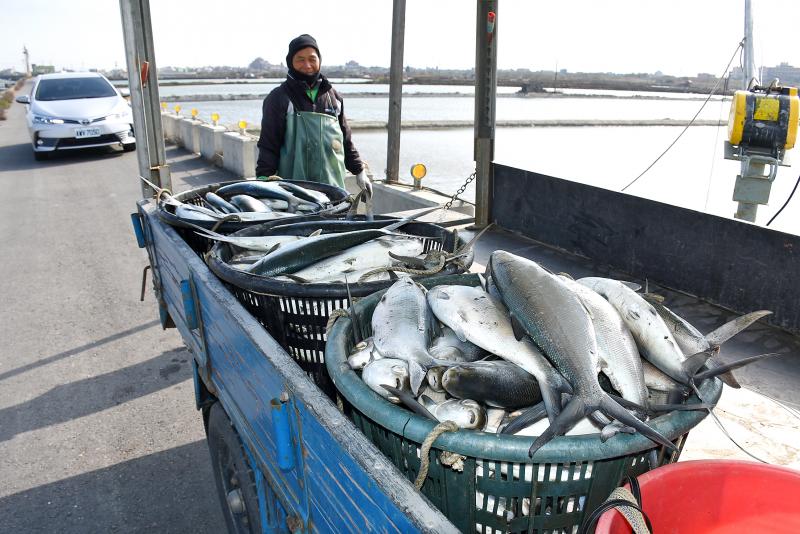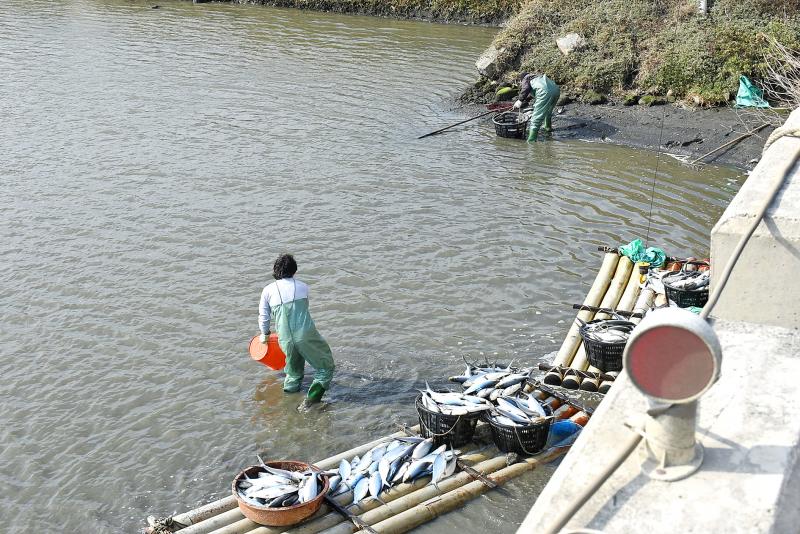Despite the temperature rising to a high of 23 degrees Celsius on Jan. 3, the cold snap continues to inflict heavy losses on Yunlin County’s milkfish farming industry. As of Jan. 3, the bitter weather had frozen to death or inflicted frostbite on more than 190,000 milkfish on the county’s fish farms, which accounts for 50 percent of the farms’ milkfish population.
Yunlin County Agriculture Department Deputy Director Tsai Keng-yu said that, as of 4pm on Jan. 3, cold-damage data provided by the relevant public bodies showed that Taisi Township was the worst affected, with 700 hectares of farm affected and 140,000 fish dead or injured, or approximately 60 percent of fish population lost. About 300 hectares of fish farms in Sihhu, Kouhu and Mailiao townships had been damaged, which equates to about 50,000 fish, or 30 percent of the local farms’ fish stocks. The entire county had lost 190,000 fish, but the death toll could rise further as some fish farmers had not yet finished dredging their ponds.
A fish farmer surnamed Ting from Taisi Township said he was breeding approximately 1,500 milkfish on his fish farm and had been raising them for over one year. Ting said the cold snap had almost completely wiped out his fish. Furthermore, because milkfish are “working fish” reared within a clam pond polyculture, and are therefore not the fish farms’ primary breed species, it will be difficult to quantify the extent of the losses. However, what is certain is that without the assistance of the milkfish chomping through algae and other surface growth, farm owners would have to regularly carry out manual dredging of their ponds. As well as significantly increasing their workload, this could also result in a reduction of the water quality, which might kill the clams and cause more than NT$1 million in losses.

Photo: Lin Kuo-hsien, Liberty Times 照片:自由時報林國賢
Another fish farmer, surnamed Yao, said that he had turned his fish pond’s waterwheel up to full speed during the cold weather, which, in addition to groundwater percolation, meant that only a little over 100 of his fish perished. However, Yao said that those fish lucky enough to survive were a ghost of their former selves, exhibiting much-reduced energy levels. “If we get another cold snap, they might not be able to survive. All I can do is wait and pray,” said Yao.
(Liberty Times, translated by Edward Jones)
雲林縣一月三日氣溫回升,高溫來到二十三度,但這波寒流仍重創養殖虱目魚,截至三日凍斃、凍傷已逾十九萬尾,超過養殖總數五成。

Photo: Lin Kuo-hsien, Liberty Times 照片:自由時報林國賢
雲林縣府農業處副處長蔡耿宇表示,根據各公所三日下午四點為止回報寒害統計,台西鄉受害最嚴重、約有七百公頃,凍死傷約十四萬尾,損失逾六成;四湖、口湖與麥寮三鄉受害面積約三百公頃,約有五萬尾,損害約三成多,總計全縣已超過十九萬尾,由於部分業者還未打撈完畢,災情可能還會增加。
台西鄉丁姓養殖業者說,他的養殖魚塭養了約一千五百多尾虱目魚,已經養超過一年,這波寒流幾乎全軍覆沒。由於虱目魚是文蛤池混養的工作魚,並非主要養殖物,很難說損失多少,但少了虱目魚協助吃食塭池藻類苔鮮,業者必須常常下魚塭撈藻類,增加不少工作量,也可能造成水質變壞文蛤死亡,屆時損失將超過百萬元。
姚姓養殖業者說,這波寒流他魚塭水車全開,加上引灌地下水,只有死掉一百多尾,但僥倖逃過寒害的魚,活動力已大不如前,若再有寒流低溫,恐怕熬不過,只能「挫咧等」。
(自由時報記者林國賢)

The 2025 Seoul International Book Fair was held from June 18 to 22 at the COEX Convention & Exhibition Center in Seoul, South Korea. This year, participants from 17 countries attended, with over 530 publishing houses and related organizations taking part. For the first time, Taiwan participated in the book fair as the Guest of Honor, bringing together more than 85 publishers and presenting a curated selection of 550 titles. A delegation of 23 Taiwanese creatives traveled to Seoul to attend the event, including 13 literary authors, six illustrators, and four comic book artists, among which were a film director, an

A: What exhibitions are you going to see this summer? B: The 100% Doraemon & Friends exhibit is set to open on June 28. A: The news says there will be a 12-meter-tall giant Doraemon model at the Huashan 1914 Creative Park. B: The One Piece Carnival will set sail on the same day. A: And the D’festa Taipei 2025 – featuring exclusive content from K-pop supergroups such as BTS, NCT and Twice – is also set to begin next Friday. Isn’t that cool? A: 今年夏天還有什麼展覽可看啊? B: 「100%哆啦A夢 & Friends特展」即將在6月28日開幕。 A: 新聞說在華山1914文創園區會場,還有12米高的巨型哆啦A夢呢! B: 航海王「One Piece歡樂派對嘉年華」也將在同日啟航。 A:

The new generation born between 2025 and 2039 has been officially named “Generation Beta,” or simply “Gen Beta.” This generation will be the first to experience a world where artificial intelligence (AI) plays a key role in daily life. Generations are defined by shared cultural, social and historical experiences within a specific time frame. These experiences, often influenced by significant events and technological advancements, shape the values, attitudes and behaviors of each generation. The concept of generations helps us understand how different age groups interact with their environment and contribute to societal changes over time. The previous generational transition from Gen

Continued from yesterday(延續自昨日) https://www.taipeitimes.com/News/lang As Gen Beta grows, they are expected to witness advanced technologies becoming fully integrated into various fields like education, workplaces, healthcare and entertainment. In addition to technological developments, they will also face big challenges like severe climate change. Influenced by their Gen Y or Gen Z parents, who view climate change as a critical issue for the future and prioritize sustainability, they are likely to focus more on global issues and seek innovative solutions to address them. Moreover, Gen Beta will experience considerable demographic changes, such as lower birth rates and longer lifespans. Consequently, Gen Beta is predicted to